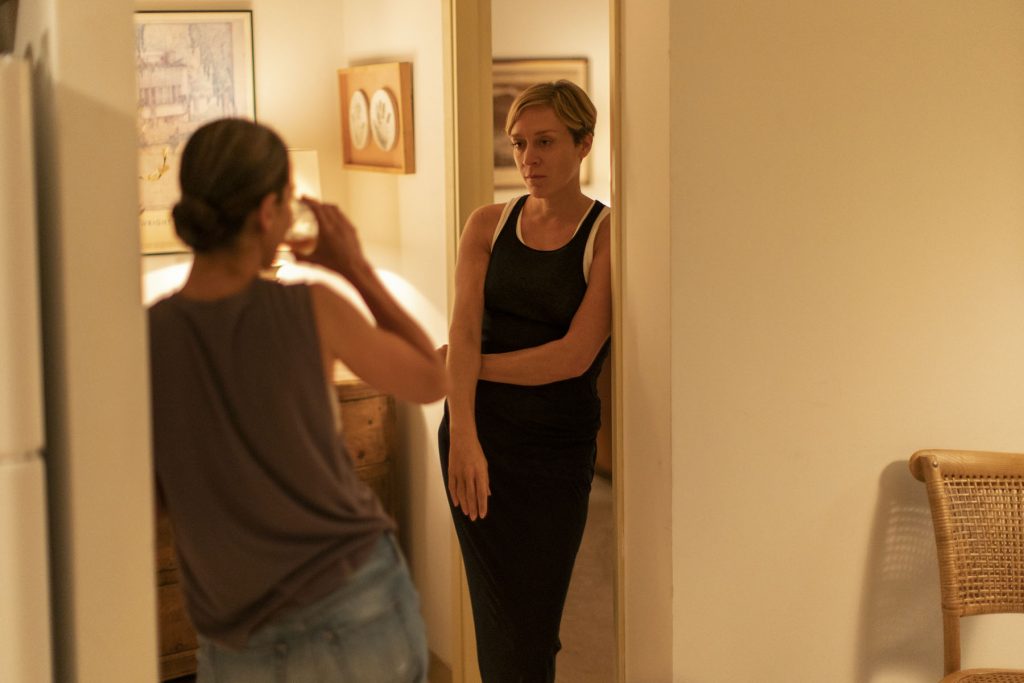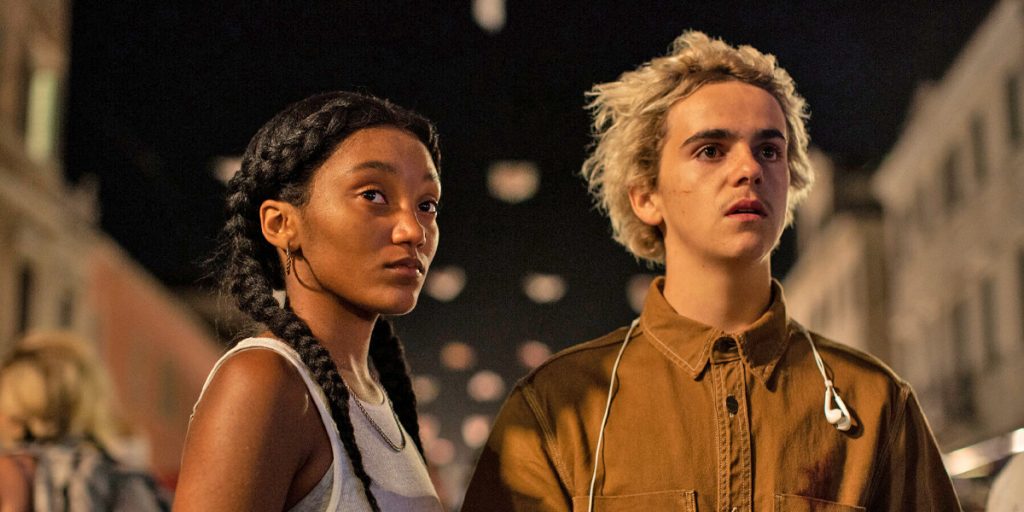We Are Who We Are is a coming-of-age drama series from Luca Guadagnino – his first foray into television – that starts slow, but does eventually blossom.
By the end of his eight-part limited series, director Luca Guadagnino wants audiences to come away understanding the love, confusion and restlessness of self-discovery. It reads as somewhat of a spiritual successor to his acclaimed film Call Me By Your Name (2017), wherein the dizziness of that all-consuming first love is showcased against the stunning backdrop of rural Italy. But with We Are Who We Are, Guadagnino (and fellow writers Paolo Giordano and Francesca Manieri) cast a wider thematic net and explore issues surrounding love, friendship and identity – gender and sexual – within the concentrated, intense environment of an overseas US military base.
Fourteen year old Fraser (Jack Dylan Grazer) moves to Italy from New York with his mothers, new base Commander Sarah (Chloë Sevigny) and her wife Maggie (Alice Braga). Initially shy and conspicuous with an affinity for bold fashion, he soon forms a close bond with Caitlin (Jordan Kristine Seamón), a young girl who has lived on the base for years. Together, they navigate the messy, exhilarating, confusing and frustrating world of being a teenager in a regimented, isolated slice of America, surrounded by the freedoms of Italy.
For fans of Guadagnino, his directorial style is immediately apparent while we follow Fraser throughout episode one as he explores his new home, but newcomers might find it a struggle. The pacing is languorous, and Fraser’s bratty, rude and petulant behaviour make it difficult to embrace him as someone we might want to spend any extended time with. But as he dizzily explores Italy, getting more lost, drunk and sombre, it soon becomes clear that his acting out stems from him feeling displaced, from his sudden isolation on an entirely different continent from everything he’s known before. Grazer imbues Fraser with an almost desperate need for attention and acceptance, within himself and from those around him. His performance is purposely awkward: he switches from frustrating to endearing faster than the mood swings of a sulky teenager, which the character very much is. And so, as the series progresses, he becomes less grating and it is easier to invest in him as a character.
Less so, however, in the relationship he has with his mothers. The interactions between them fluctuate from very childlike (at one point Sarah clutches him to her chest, smelling his hair, and at another Fraser curls up in a ball and yells “invisible shield” when he doesn’t want her to touch him), to almost too adult, (whilst she cleans a cut on his face, Maggie frankly tells Fraser how it feels when she and his mother kiss), to nigh on abusive (Fraser slaps Sarah, tells her over text how long she is to wait before speaking to him, and repeatedly screams that he hates her). It’s a dynamic that is uncomfortable, jarring and almost unnecessarily complicated considering it is never fully explored.

Newcomer Jordan Kristine Seamón absolutely shines as Caitlin. At first, she seems confident and sure of herself, if a little indifferent to the minutia of everything around her. But slowly it is revealed that Caitlin struggles with her gender identity. Seamón’s understated performance tells without being showy; the near-reverence with which she handles male clothing and strokes the hair on Fraser’s face and legs, and the glow of happiness when she successfully introduces herself as ‘Harper’ to an infatuated local girl, make her performance authentic and believable. The chemistry between her and Gazer is equally as authentic, it really feels like these are two young people who truly understand each other, who feel a deep mutual connection whilst they figure themselves out individually. Their relationship is the highlight around which the show revolves.
Which makes it so frustrating, then, when the focus shifts to other characters and loses what little momentum it has. The concurrent plots deal with some equally weighty themes – Caitlin’s brother Danny (Spencer Moore II) wrestles with religion and not knowing his biological father; while Sarah struggles with power dynamics at work, Maggie’s infidelity, and the previously mentioned difficult relationship with Fraser – but they simply don’t feel as compelling. Nobody ever feels truly developed, and so, when emotional resonance is expected, it gets lost because there simply hasn’t been sufficient emotional weight placed on the characters. It ends up feeling a bit flat. The acting is naturalistic, but sometimes feels clunky when paired with dialogue that can be quite jarring. The show is trying to do too much, covering too many people and issues, when the beating heart is Fraser and Caitlin.
Visually, though, We Are Who We Are is stunning. Whilst experimenting with different colourings and point of view shots, Guadagnino’s tendency to keep the camera still and let his characters move within the frame truly makes it seem like the audience is simply witnessing a snapshot into their lives. Bookending the show are two particular stand out shots: in episode one, the camera tracks Fraser as he navigates the setting, stumbling through soldiers, his peers and the locals, drenched in sunlight and desperately searching for something he can connect to. Then in episode eight, the camera tracks Cailtin as she marches through the deserted streets of Bologna at midnight, wrestling with her shifting perceptions of who it is she truly wants to be. They are indicative of what the show is truly about, the journey these two characters are undertaking to discover themselves, and perfectly encapsulate how lonely self-discovery can be.
Ultimately, sticking with the show is rewarding if a little frustrating. The finale is an absolute delight, taking place mostly at a concert wherein Fraser and Caitlin come to understand what the ability to truly be who they are means for them, but the resolution of every other plot strand feels a tad unsatisfying. The show proves Call Me By Your Name wasn’t a fluke, and Guadagnino truly has a talent for visualising the tumultuous experience of being a teenager. It’s just a shame that everything outside of Fraser and Caitlin’s journey doesn’t work nearly as well.

